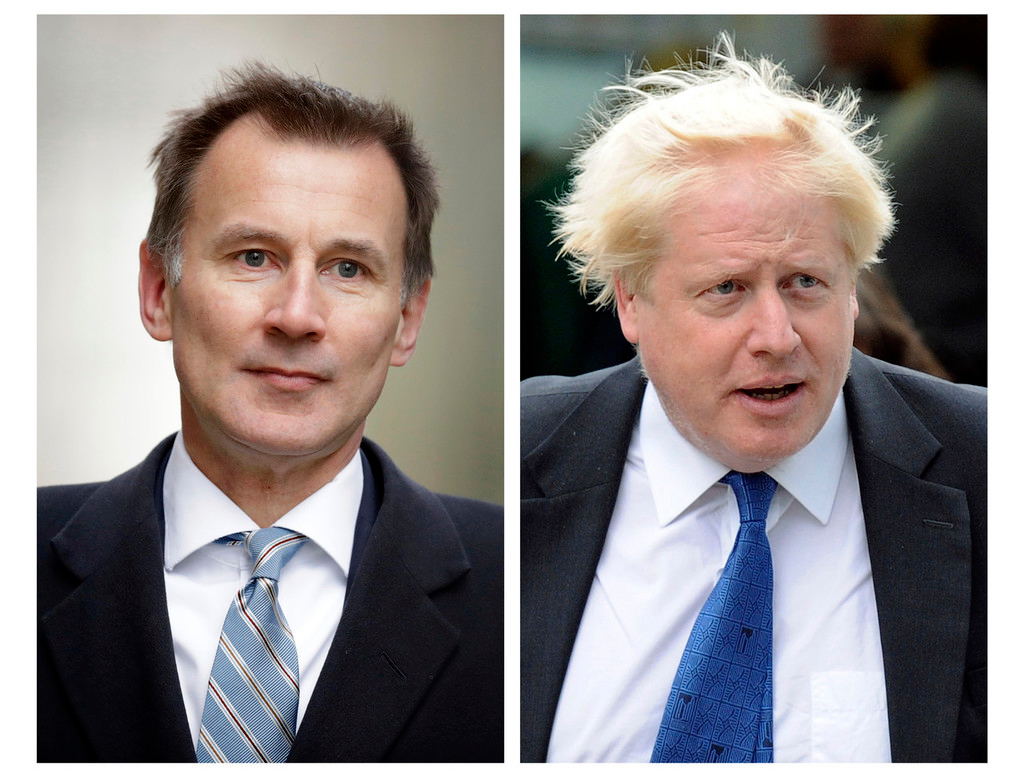UK leadership race boils down to final two
By Jonathan Powell in London | chinadaily.com.cn | Updated: 2019-06-21 04:28

The final two candidates in the Conservative Party leadership election race to be the United Kingdom's next prime minister were decided on Thursday, with Jeremy Hunt selected to face off against Boris Johnson.
A field of four was whittled down to three in an afternoon ballot, when Sajid Javid was eliminated, before the remaining two were confirmed when Michael Gove was eliminated in the evening.
Boris Johnson got 160 votes, Hunt netted 77, and Gove 75.
On Wednesday, Rory Stewart was eliminated from the contest after he lost the votes of 10 MPs between Tuesday's second round and the third ballot, in which he was backed by just 27 MPs.
Prior to Wednesday's ballot, Stewart was the only remaining candidate to have ruled out a no-deal Brexit and the only to argue that British Prime Minister Theresa May's existing EU withdrawal agreement could not be renegotiated with Brussels.
In a warning to the candidates still left in the race for 10 Downing Street, he said: "My judgement, my professional, considered judgement, is that what I said is true.
"We will now see, between now and the end of October, whether people can deliver what they promised and my instinct is they can't."
After Thursday's vote, the hustings process begins nationwide and 160,000 party members will decide in a postal vote between the final two candidates. The new leader will be announced in the week of July 22.
Work and Pensions Secretary Amber Rudd told the BBC she was not "resigned" to Johnson becoming prime minister.
"We haven't seen much of Boris," she said, adding that there were 16 hustings coming up over three weeks, with plenty of opportunities for members to decide who would be the best prime minister and "not just a good campaigner".
The leadership campaign has been dominated by Brexit — with the candidates criticizing each others' plans for getting the UK out of the EU by the Oct 31 deadline.
British politicians' concern over the Irish border backstop arrangement was a key reason why May was unable to win approval for her European Union withdrawal agreement with Brussels.
Reports this week indicate Ireland is considering a no-deal Brexit budget for 2020, meaning it will slash spending significantly. It suggests that Leo Varadkar's government is prepared to resist any British pressure to make concessions on the backstop deal struck for the Irish border.
Minister for Finance Paschal Donohoe said this week that Dublin would decide "later on in the year" which option to adopt for the 2020 plan.
The Financial Times reported that as the October budget is due to be unveiled only weeks before Brexit day on Oct 31, Irish government figures would base plans on the premise of a no-deal.
Donohoe will in the coming weeks outline the budget resources available in the case of an orderly Brexit and a disorderly crash-out on Oct 31.
Varadkar, Donohoe and ministers will have to choose by September at the latest which scenario to base the budget on.
A no-deal budget was emerging as the likelier option since there was unlikely to be clarity on Brexit by September, when budget preparations and negotiations would intensify.
























